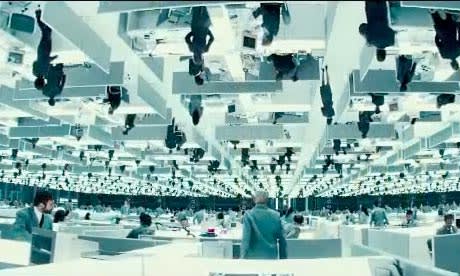Much like his little-seen directorial debut, Northeast, Juan Solanas's Upside Down is a scathing critique of capitalism and dictatorships, telling the story of two people from very different worlds coming together against all odds. It's a marked attempt to broaden and make accessible his ostensibly communist auteur assertion, using the universality of a love story set in a high concept sci-fi environment to substitute for the more literal machinations of Argentinean — Solanas' native country — polemics.
The world of Upside Down is divided into equally inverse segments, each with an adverse gravity field that meet in the middle of their respective skies. Adam (Jim Sturgess) lives in a poor section exploited for its resources (oil), which is then sold back as energy they can't afford. Looking up at the affluent world above — a wide, far-off metropolis in the sky — he literally dreams of reaching for the stars, eventually playing with the gravitational divide and establishing an unlikely relationship with Eden (Kirsten Dunst), a young woman from the world above.
Having opposite gravitational pulls, their nascent affections are problematic enough without the added difficulty of bursting into flames should either of them spend too much time in the other's respective environment. Add to this a bit of amnesia on the part of Eden — after military officials try to break up the forbidden lovers — and the central narrative takes shape: Adam develops beauty products in an effort to work his way into the upper world and win back the heart of a lover that has forgotten who he is.
Visually, the industrialized metropolis and gimmick of items falling upwards or people requiring rope or seatbelts to communicate are quite fascinating and wondrous to behold. Shots of central locales, where both worlds are within arms reach of each other, are of particular aesthetic intrigue, requiring an abundance of attention to detail to work.
Unfortunately, the relationship forged between Adam and Eden, whose names have obvious robust biblical intentions, is exceedingly shallow. She's written as an empty vessel — a smiling, beautiful cipher secondary to the political subtext, which is a problem when the emotional impetus of the movie relies on our investment in their finding a way to be together.
Without this, and minus any theme greater than that of idealized universal harmony, there's only the visual effects and curious inclusion of upside down urination to compel. Even the sweeping voiceover, intended to frame the story and give it a grandiose nature, tends towards the prosaic and silly, quashing most of the amazing potential this inventive concept implicitly had.
(eOne)The world of Upside Down is divided into equally inverse segments, each with an adverse gravity field that meet in the middle of their respective skies. Adam (Jim Sturgess) lives in a poor section exploited for its resources (oil), which is then sold back as energy they can't afford. Looking up at the affluent world above — a wide, far-off metropolis in the sky — he literally dreams of reaching for the stars, eventually playing with the gravitational divide and establishing an unlikely relationship with Eden (Kirsten Dunst), a young woman from the world above.
Having opposite gravitational pulls, their nascent affections are problematic enough without the added difficulty of bursting into flames should either of them spend too much time in the other's respective environment. Add to this a bit of amnesia on the part of Eden — after military officials try to break up the forbidden lovers — and the central narrative takes shape: Adam develops beauty products in an effort to work his way into the upper world and win back the heart of a lover that has forgotten who he is.
Visually, the industrialized metropolis and gimmick of items falling upwards or people requiring rope or seatbelts to communicate are quite fascinating and wondrous to behold. Shots of central locales, where both worlds are within arms reach of each other, are of particular aesthetic intrigue, requiring an abundance of attention to detail to work.
Unfortunately, the relationship forged between Adam and Eden, whose names have obvious robust biblical intentions, is exceedingly shallow. She's written as an empty vessel — a smiling, beautiful cipher secondary to the political subtext, which is a problem when the emotional impetus of the movie relies on our investment in their finding a way to be together.
Without this, and minus any theme greater than that of idealized universal harmony, there's only the visual effects and curious inclusion of upside down urination to compel. Even the sweeping voiceover, intended to frame the story and give it a grandiose nature, tends towards the prosaic and silly, quashing most of the amazing potential this inventive concept implicitly had.




